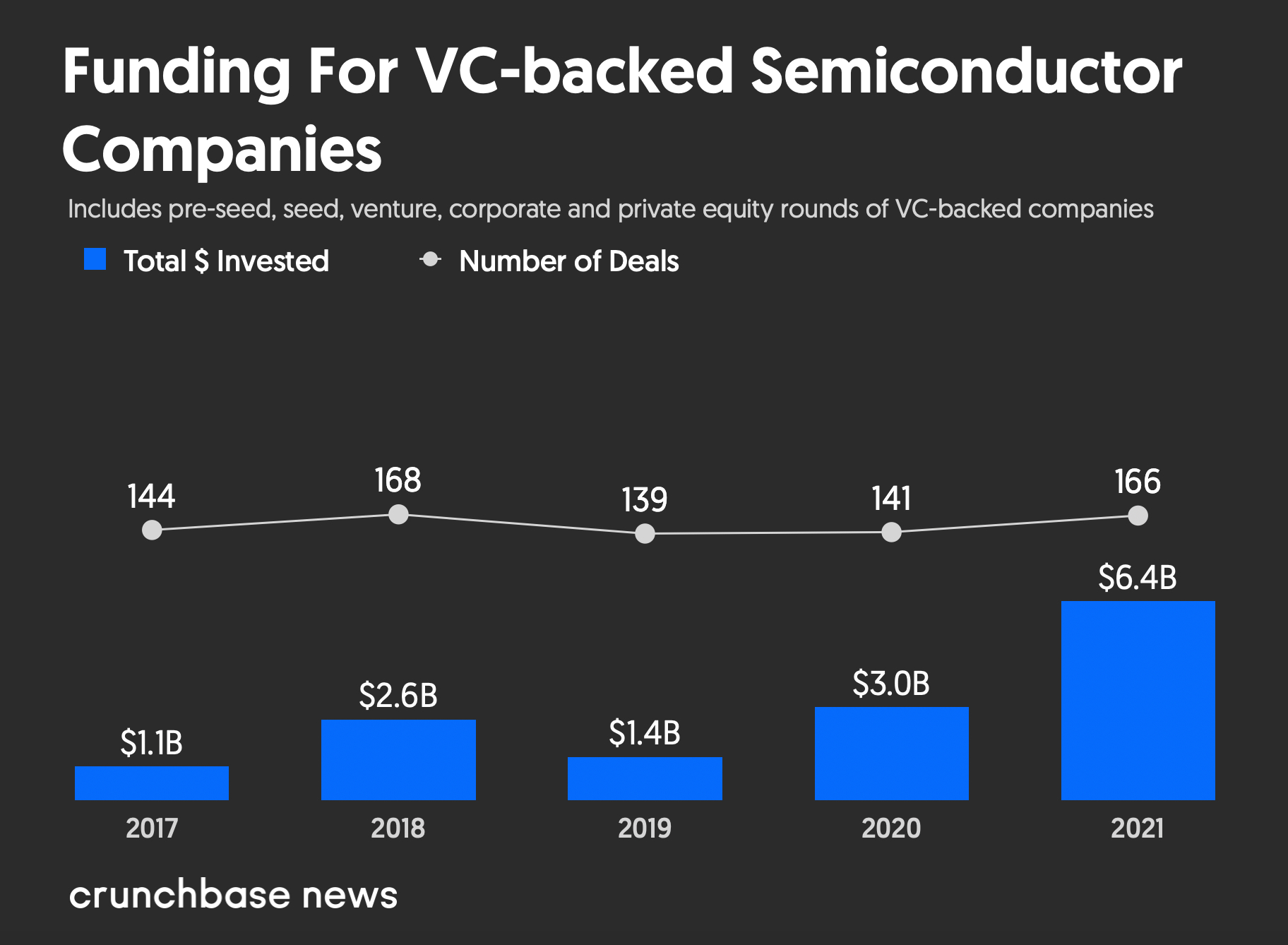Editor’s note: Mergers & Money is a monthly column by Senior Reporter Chris Metinko that covers dealmaking and the flow of venture capital in the enterprise tech space.
There may be a shortage of semiconductors, but there’s no lack of venture funding to companies in the chip space.
While most of the talk around semiconductors revolves around disruptions in the supply chain, the industry actually saw an unprecedented amount of venture capital in 2021—as well as one of its biggest M&A years ever.
The beginning of the new year also indicates that while venture dollars may be down in 2022 so far, dealmaking seems poised to still make headlines.
VC-backed semiconductor startups—which includes everything from chipmakers to design firms to hardware developers—saw more than $6.4 billion in funding last year, Crunchbase numbers show. That’s the most in at least five years and easily bests the $3 billion seen in 2020.

Deal flow also was healthy, with 166 rounds being announced last year, just below 2018’s total of 168 which is the high-water mark of the last five years.
Search less. Close more.
Grow your revenue with all-in-one prospecting solutions powered by the leader in private-company data.
Some of the largest deals include:
- In April, Palo Alto, California-based hardware and integrated systems developer SambaNova Systems closed a $676 million Series D at a $5 billion-plus valuation;
- In August, China-based Eswin, a developer of integrated chips, closed a $473.7 million Series B, and then followed that with a $395.2 million Series C in December; and
- In November, China-based Moore Threads, a provider of graphics processing unit technology, raised a $316.2 million Series A.
Of course, those rounds were raised against the backdrop of a perfect storm in the industry. The pandemic and supply chain disruptions shook things up just as more chips were needed for the exploding amount of connected devices and emerging sectors like more autonomous vehicles and robotics.
While those issues still remain, 2022 has started off slow for companies announcing funding. Thus far this year, only 25 rounds in the semiconductor space have been announced and totaled only $175.9 million. Still, a few rounds like the ones mentioned above could quickly pull those numbers up.
M&A dealmaking
Although funding rounds seems to have dried up this calendar year, M&A dealmaking remains in the news—even if some of these headlines are for deals that are now dead.
The month started with the proposed $40 billion Nvidia/ARM deal on its last legs before Nvidia, the most valuable semi company in the world, announced it was pulling out of what would have been the biggest semiconductor deal in history.
The deal, like many semiconductor deals in the past, faced pressure from a vast array of regulators concerned the proposed marriage would stifle competition. The Federal Trade Commission filed suit in December to block the deal, while both the British and Chinese expressed a myriad of concerns.
As that deal was dying a slow death, Santa Clara chip design giant Intel announced a $5.4 billion deal to buy Israel-based chipmaker Tower Semiconductor. The purchase seems to be the next step in Intel’s push to create a large foundry operation—i.e. manufacture more chips and offer services to other chipmakers and designers—which it announced last March.
The deal would be the largest the industry has seen since last December when Billerica, Massachusetts-based Entegris announced it would acquire Aurora, Illinois-based CMC Materials for $6.5 billion.
Last year saw 54 M&A deals in the semiconductor space, the most since 2015 when there were 56, according to Crunchbase data. VC-backed companies were not left out of the dealmaking, however, as 17 such semiconductor companies were scooped up last year, the most since 18 were acquired in 2016.
Two deals involving VC-backed companies passed the $1 billion mark last year:
- Qualcomm’s acquisition of Santa Clara, California-based Nuvia for $1.4 billion in January 2021.
- China-based Wise Road Capital’s $1.4 billion purchase of South Korea-based MagnaChip Semiconductor in March of last year.
While dealmaking has been slow this calendar year—fewer than a half dozen—deals such as the Intel/Tower proposed marriage show the heat is still in a sector where demand has never been greater with so many people needing to be connected.
That heightened investment interest should only continue to build as more tech giants such as Apple and Google unveiled plans to design their own chips and more focus is put on chip design and optimizing chips, which ideally could cut down on the amount of chips needed and likely decrease the pressure currently on the tight supply chain.
Illustration: Dom Guzman

Stay up to date with recent funding rounds, acquisitions, and more with the Crunchbase Daily.











![Illustration of stopwatch - AI [Dom Guzman]](https://news.crunchbase.com/wp-content/uploads/Halftime-AI-1-300x168.jpg)
67.1K Followers